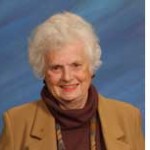By Natasha Josefowitz

LA JOLLA, California — In October 1939, the SS Saturnia brought my family over to America as frightened and hopeful refugees from war-torn Europe. Tragically, the ship was torpedoed on her return trip.
In March 1948, I was on her sister ship, the SS Vulcania, with my parents returning to Europe for the first time since we had to leave France. In those nine years, I had finished high school and college and became fluent in English. Sitting on the deck of the ship at the end of the eleven-day voyage, I was drinking Italian coffee with the ship’s captain and my shipboard romance (a young Neapolitan newspaper man I had met on board). He kissed me as we watched the sunrise over Naples. My parents were continuously angry with me because they thought I was flirting too much. Much to the dismay of my incredulous parents, the charming, handsome young man asked for my hand in marriage, which they promptly dismissed.
Upon our arrival, we stayed at the Excelsior Hotel. My Italian beau called on me that evening, inviting me to a party with some friends of his. I told my parents that it was a wonderful opportunity to practice my Italian; they reluctantly agreed. Before another word could be said, I was riding away on the back of his motorcycle. When I returned in the wee hours of the morning—having had a wonderful time living “la dolce vita”— I was met by very distraught, sleep-deprived parents ready to call the police. Too late they had realized that they did not know the name of the young man who took me away nor the name of the place he was taking me to. Instead of being relieved at seeing me returned safe, they yelled at me for having caused them such anguish.
After the war, the poverty in Naples was inescapable. The hotel’s restaurant bordered the street with faces of shoeless children glued to the window watching us eat; needless to say, we could not finish our meal. We grabbed whatever we could from the table and brought it over to them.
We traveled by car from Naples to Switzerland, accompanied by a friend of my parents, Gregory Ratoff, the Hollywood director who was well-known in Italy and made it possible for us to visit people and places not usually accessible to tourists. We met the director of the La Scala opera house and sat in his loge. We also visited the Quirinale Palace in Rome by special permission, passing through room after room of yellow satin chairs, red draperies, marble floors, painted ceilings, and priceless tapestries.
One of the highlights of that trip was the Teatro di San Carlo opera house with its red velvet loges in a semi-circle around the stage—an opulent reminder of another age. In Pompeii, ladies were not allowed in the room with sexually explicit frescos; today we can see them on television. We walked among sulfurous plumes of smoke and boiling mud coming out of the ground from the still-active Mount Vesuvius volcano. We took the ferry from Sorrento to Capri, where we sailed into the famous cave at low tide. My parents bought me a coral necklace there, which is still one of my favorite pieces of jewelry. There were moments when I stopped in awe, not just in front of some Etruscan painting or even gazing at the monumental David by Michelangelo, but standing on the same cobblestones of the Coliseum in my sneakers where Roman sandals had tread before.
In the Italy of 1948, there were hardly any cars on the road, no machinery to be seen in the fields, only white oxen pulling wooden plows. The Ponte Vecchio in Florence was crowded with small shops selling souvenir trinkets. I bought some silk slips and nightgowns, which no one wears any more. (Seventy years later, I wear a comfortable, long cotton t-shirt to bed.)
My mother’s back was bothering her, so my parents decided to stay in Florence and skip Venice. This was not a city I could miss, so I took the train on my own and arrived late in the evening. My gondola slid along the narrow canals under a new moon to a 13th century Moorish palace converted into a hotel. The next day I visited St. Mark’s Cathedral with its huge square and fed the pigeons. Venice was a silent city: no cars, not even bicycles, only the black gondolas sliding slowly by palaces standing alongside the canals and looking like finely chiseled angel food cakes.
That evening in my hotel room I heard an accordion playing under my window. I was twenty-one, alone in Venice, wondering with some poignancy whether I would ever be back and with whom.
© Natasha Josefowitz. This article appeared initially in the La Jolla Village News. You may comment to natasha.josefowitz@sdjewishworld.com